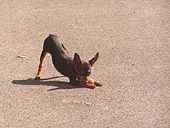Pražský Krysařík
 | |||||||
| Pražský krysařík | |||||||
| Other names | Prague Ratter | ||||||
|---|---|---|---|---|---|---|---|
| Country of origin | Czech Republic | ||||||
| |||||||
| |||||||
| Dog (Canis lupus familiaris) | |||||||
The Pražský krysařík (Prague Ratter) is a small breed of dog from the Czech Republic that is rarely seen outside its country of origin. It is the smallest breed in the world by breed standard, because of the maximum height of the dogs, unlike Chihuahuas who are measured by weight.
Description
Appearance
Also known as the pražský krysařík, and often confused with the Chihuahua and the Miniature Pinscher, the dog's coat consists of short, glossy hair and the most common color is black and tan, which is also the original color. Lately, other colors have been approved: Brown and tan, Blue and tan, Lila and tan, Yellow, Red and Merle. It is 2 cm shorter in maximum height than the minimum height of the Miniature Pinscher. Ideal height is 20 cm to 23 cm. Adult weight is mostly between 1.5 kg to 3.5 kg. Generally the best weight is 2.6 kg.

Temperament
Best known for its active and lively nature, the Prague Ratter is a spunky breed that is full of original character. These tiny dogs thrive on strong and dependable relationships with humans, love to receive affection and play the role of lap dog during down time. This breed is highly intelligent and generally responds well to basic training and commands. As a pet, the Prague Ratter is obedient, loyal, loving, and very affectionate. The Prague Ratter adapts well to full-time indoor and apartment living, yet still enjoys spending time outdoors, playing games such as fetch, and taking long and leisurely walks. They are also known to be a very quiet dog unlike many other small dogs who tend to be very "yappy". Like any small dog one should be wary of allowing them to develop Small Dog Syndrome as they can become aggressive if they are allowed to become dominant over their owners.
Train-ability
Due to its need for human attention and eagerness to please and impress its owner, the Prague Ratter generally responds well to basic training and commands. This bright breed has the ability to learn to perform many impressive tricks and tasks. Many owners claim that these dogs can easily be taught to use a litter box, this eliminating the need for constant trips outdoors.
Establishing immediate trust and respect is key to successfully training the Prague Ratter. These dogs can be somewhat sensitive to criticism and respond best to positive reinforcement and reward-based training.
Areas of Use
Prazsky krysarik might be small, but is nevertheless an easy dog to train as long as it is treated consistently. It can be trained for agility, freestyle, obedience, tracking etc. The sense of smell and hearing is highly developed, and prazsky krysarik is still a great rathunter, just as its original purpose was. They have a high prey drive and will readily go after squirrels, rats, and mice.
History
The breed was popular in central European royal palaces in the Middle Ages. It was already an established breed by the time of the rule of the Polish king Bolesław II the Generous (1058–1081). He became fond of the Ratter and had two of them imported from Bohemia. As their name suggests they were also commonly used as rat catchers in rural and urban households. The popularity of the Prague Ratter started decline in the 19th century when the Miniature Pinscher became more fashionable. The breed went through a renaissance in the 1980s as Czechs and Slovaks started to breed them again. It is not yet an FCI acknowledged breed, as there is only about 2500 Prague Ratters registered and they usually only have 1-3 puppies per year. They are nevertheless presented at shows in the Czech Republic and Slovakia.
Health
Subject to bone injuries due to their small size. Also subject to patellar luxation, an ailment common to small breeds. Krysariks can also have retained baby teeth which may need to be pulled to prevent further problems with dentition.
Life expectancy
The Prazsky krysarik has a life span of 12 to 14 years.
External links
- U.S. Breeder of Prague Ratters
- prazsky-krysarik.cz
- Prazsky Krysarik club of Sweden (multi lang)
- Prazsky krysarik Breed Standard
- in Danish
| |||||||